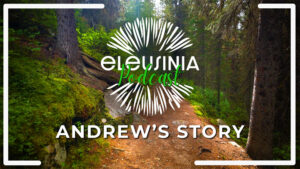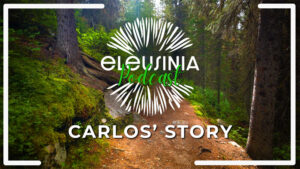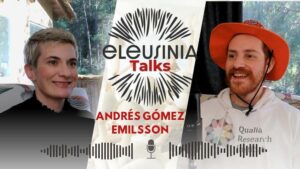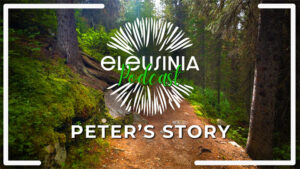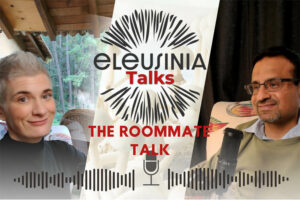Warren tells his story as a guest at Eleusinia who has dealt with phantom limb pain for most of his life. Warren dives into what psilocybin combined with mirror therapy can do, as well as so much more. Listen here or on Apple Podcasts.
Tawnya: You have made it to the psilocybin podcast with Tales from Eleusinia, a unique science-based psilocybin retreat out of Mexico that not only focuses on brain health and wellbeing, but actually specializes in pain management. I am your host, Tawnya, the medical director come along. As we break down the latest in psychedelic research news and the inner workings of this amazing experience.
I am so excited to introduce to you this next guest. Warren was a guest at Eleusinia. He came because he was looking to work with the chronic pain of phantom limb pain. Warren tells his story of losing his arm at 15 years old. What it was like to come to Eleusinia learn to work with mirror therapy and psilocybin and all the unexpected details that unraveled. You’ll love this enjoy.
Warren. Thank you so much for coming to the show. It’s just wonderful to see you again. Can you tell us a little bit about who you are and the work that you do?
Warren: Thanks for having me on Tawnya. My name is Warren and by day I am a director of research for a firm in Silicon Valley that works in life sciences.
And, you know, I was so fortunate to come to Eleusinia, I guess now about three weeks ago and just had this life transforming pathway opened up and you know, now three weeks later, I’m still integrating and learning so much about myself. So much about this practice and, you know, excited to be on your program and maybe share some of my experiences, maybe help people in this path to discovery about themselves.
Tawnya: Yeah. And I’d love to jump right in Warren, kind of about what your expect your expectations were to begin with and then what they evolved to be.
Warren: Yeah. So, I mean, first of all, all credit goes to my amazing and superhuman wife who, as a bit of context, I lost my arm when I was in my teens in a farming accident.
And so I’ve suffered with phantom limb pain for the better part of 40 years, and I just kind of learned to live with that. It’s just something you never thought you would get rid of, or I never thought I’d get rid of and just kind of accepted it for what it is, but you know, my wife being the tenacious bulldog that she is, does not sit with someone in her life being uncomfortable.
And so for the last couple years, she really researched approaches and methods to kind of help in that space and came across Eleusinia and really gravitated towards it because of the science based approach around pain and pain management, and that was so instrumental in both of us feeling comfortable.
And so we came to this as a couple. For me trying to kind of solve some of these chronic pain issues, but also deeper issues that us as a couple trying to relate to each other after a, you know, a long time of marriage being, being in love, but also the struggles of life and the stories that we build up over our lifetime. And I can tell you three weeks later, we just feel so empowered and so reset in beautiful ways that I think are impactful for us moving forward.
Tawnya: Would you like to share some of the story about around deciding to come, getting there, arriving, and just jumping right in.
Warren: Yeah. So, like I said, my wife did a lot of research. I liked it. You know, I’m looking for solutions all the time. I’m a finder, and my wife is very much a finder. We’re always trying to kind of find ways to improve ourselves, whether it’s physically, emotionally, and like I mentioned, you know, I’ve suffered with this chronic pain that I never really kind of thought could be solved.
And my wife was very adamant that this, you know, psilocybin approach combined with some mirror therapy work was really impactful at kind of minimizing some of the phantom limb pain. And so, you know, we came into this with a really open mind, got a lot of good understanding from Jessica around how the retreat would work.
But I think what really kind of stuck with us is, it’s not just that you’re going to go on a four-day retreat. You’re going to come out of this with tools, with knowledge, things like being able to cultivate, being able to integrate, you all continue to support us every week with meetings, zoom meetings, where we can get together and do breath meditation work, or we can do integration talks, or we can talk about cultivation.
And that’s something that I’m just so blown away and so thankful for. It wasn’t just a, you know, here’s your four days have fun. Take this amazing trip and then good luck. And you know, maybe we’ll see you again down the road. You guys actually follow that up with this kind of constant and supportive approach to helping us live this life as we, try to develop it into our life. Because it’s easy to kind of fall back if you will. And so I think that’s, what’s so cool about this. You guys give us the tools to continue this practice throughout.
Tawnya: Warren. Can you take us back to what it was like and the experience of losing your arm and how you were coping at that point?
Warren: Yeah. I mean, I lost it when I was 15 and it was in a farming accident. It was pretty traumatic. Like many kids who grew up on a farm, you know, we weren’t well equipped for emotional work and our families and our family lineage was very much pull yourself up by your bootstraps. Not to say my parents weren’t loving and caring, they absolutely were, but how to deal with huge emotional trauma and physical trauma is not something many in that generation knew how to do. So, I stuffed a lot of things. And I told this story to my wife and other people, it’s like, I didn’t actually cry when I lost my arm at 15.
If you can imagine having physical limb severed, it took me three months of working in a field. I was out by myself, changing irrigation and moving pipe around and I kind of just melted down and had this expulsion of anguish and frustration three months after the fact.
And so that’s really kind of telling of my life that in many ways, I’ve tried to stuff, numb, not feel either physical discomfort or emotional discomfort. And I can tell you, I think the gift I got from Eleusinia and the trip experience was the realization that it’s okay to go to hard places. It’s okay to feel grief, to feel discomfort.
And I can do that. And be okay and come out of that space. And so, you know, you were there Tawnya, you were part of my trip experience as were other people. A lot of my trip experience in that hero dose moments were kind of going between these grieving places, either grieving the loss of my arm or grieving the loss of my father, who I never really processed.
He was such an instrumental part of my life, but I didn’t really grieve him when he passed away three years ago and that all kind of bubbled up in meaningful ways during that hero dose.
And now I have so much power in me to realize I can be okay with feeling discomfort, whether that’s emotional discomfort or in the case of phantom limb pain, being okay with sitting in that discomfort and looking for solutions to improve it.
Tawnya: I’m curious about what you originally imagined mirror therapy to be and how it worked and how it really worked for you, and when it worked.
Warren: I really had a hard time going into it thinking mirror would work.
I’ve lived with this pain for 40 years and mirror therapy, and I didn’t even really ever try it before, but I think it probably came around in maybe the late nineties, somewhere in the nineties. So it was 10 years after losing my arm by the time mirror therapy had even been discovered.
And maybe someone had mentioned it to me at some point, but I couldn’t wrap my mind around that actually being a thing and working. How could just looking in a mirror cause this pain that has been ever present to go away? And that’s, you know, that’s the beauty of the journey of life, if you open yourself up. It’s like so many mysteries of the world, whether it’s our own body, the world around us, that we’re still uncovering and still learning.
As I kind of have done mirror therapy more after the fact and you and I did some mirror therapy during the retreat, I’ve come to see how it actually benefits me. It’s like, I can feel the sensations become less, you know this, I call it, it feels like my hand is in a vice grip.
You know, I know it’s unusual for people who don’t have this sensation, but I still feel fingers. I still feel the sensation of my fingers. I can move every finger in my mind, even though it doesn’t exist physically. And that pain is like it’s being in a vice grip and at certain levels, sometimes it can be really sharp and intense.
Sometimes it can be dull and achy and the mirror therapy, as I understand it is kind of rewiring my brain in some amazing ways that I don’t even understand. To kind of, you know, just, I don’t and I don’t know. Maybe you can help me, Tawnya, what is the brain doing in that mirror therapy that’s making me not feel as much of that pain? Do you have a sense of it?
Tawnya: Well, I just want to clarify that for the listeners that don’t really know what it’s like to be missing a limb. So the mirror is set depending on the limb that you have. So if you’re missing a leg, it would be set so that when you look in the mirror, you can see the immediate reflection of the leg.
And with you Warren, it’s an arm. So it’s set on a table, you have your one arm out, and you can look in that mirror and see the opposite reflection of a full, intact arm. And so mirror therapy when combined with psilocybin, because of psilocybin’s ability, not only with the anti-inflammatory effect, but the reset of whole pathways in the brain where we have the same pain loop.
So the neurological looping of that pain telling us it’s there, it hurts, even though there’s nothing physically happening.
There’s so many mysteries to life. Psilocybin assists that mirror therapy, but I haven’t heard long term success stories with mirror therapy alone. It seems to me that it would be such dedication and work. And when you combine it with psilocybin you get to skip the line. But I’d like to hear more about, you know, what it was like for you the first time and when it kind of worked and what that felt like.
Warren: The mirror therapy during the retreat was such an emotional experience versus a physical experience. I had not visualized myself with two hands in 40 years and that actual visualization of two hands side by side. And I did this interaction where I touched my fingers together.
You know, the real hand that exists today with the hand in the glass, and in that moment, you see yourself with two hands touching.
Tawnya: Now, this was under the influence of psilocybin.
Warren: Right. And this was under the mini dose, it wasn’t under the hero dose. And that experience not only was kind of the physical sensations, but it was so powerful emotionally. That I had not seen it in 40 years and I literally grieved and wept around that. And so some of the mirror therapy early on was a lot of letting go and a lot of grieving. And so that was an instance of grieving.
When I got back and started to integrate it into my life, there was another moment of grieving where I grieved the young man who in his late teens and early twenties going to college and trying to, you know, feel normal and feel okay. And that was such a burden I carried and such a pain I carried.
And I grieved for that young man, because I’d never done that before, you know, I’d shut down all of those emotions. So some of the mirror therapy was so cathartic in the sense of grieving and letting that out, and now, as I’ve kind of made it a daily practice, it’s really, you know, it’s really just kind of, yeah, I’m looking at this. I’m doing stretches and trying to kind of release that pain. And so it’s not like it’s an on-off switch. Like you suddenly do mirror therapy and it’s gone, but I definitely feel the impacts of it lessening as I do more of this mirror therapy in combination with psilocybin.
Tawnya: So the impacts in both ways, the way it affects your life and your own personal pain rating of what that vice grip felt like, has that decreased a little bit more during the day and its impact on you, or how would you describe that?
Warren: You know, it’s really hard to predict, and this has always been a thing with phantom limb pain.
You don’t really know when it’s going to hit you and at some level it’s always there. It has always been there. And then there would be these episodes where it would spike and be uncomfortable.
And I can never really predict it. I would always be like, did I eat something? Did something different happen? As the scientist, I’m always trying to create causation around this, but it’s so unpredictable. At least I haven’t been able to untangle it. So what I notice is generally after I do the mirror therapy, because I’m doing stretching and that kind of stuff, it feels a little more, you feel a little more.
But it’s also like stretching a sore muscle. It feels good. And I’ll notice that, you know, and I’ll check in with myself and say, well, how’s it feel now? You know, does it feel more? Does it feel less? And generally, the barometer over the last three weeks says, yeah, it feels less, and there’ll be moments where it doesn’t feel less.
It feels a little more intense. But I can definitely see the trajectory is moving in the right direction in terms of lessening pain. If that makes sense.
Tawnya: And Warren, you know, you said it that you’re a science-based guy. That’s why you were excited to come to Eleusinia. I’m curious about… you know, you’re saying that you unexpectedly had a lot of grief come up with the therapy and also you’re continuing to work with the mirror therapy. Do you see now a different perspective on how emotions are interlocked and connected with our physical body? What’s your perspective? How did it shift today?
Warren: Yeah. At the ripe old age of 55, I think I finally figured out that my emotions and my body are connected. Wow. It just, it took me a while. But in some ways I was a slow learner. I think a lot of us think that this organ doesn’t affect that organ or this doesn’t affect that because they’re different, it’s a different organ. Our brain is different from our heart, is different from our liver, whatever. But I’m really coming to realize that all of this is interconnected. And so the emotions that I would feel so impacted my body or vice versa. And I think the story I’ve carried for much of my life is trying to numb out from either emotional pain or physical pain. So, I couldn’t feel that connection or if I did feel it, I didn’t want to feel it. For me, nicotine alcohol, those were all things that I was using to my detriment for a lot of my life either to reduce physical or emotional pain.
And now, you know, I haven’t had a drink for 20 months, that feels really empowering, that I’ve finally started to recognize that by taking that away, by getting rid of that, that numbing out, I can feel more and it’s okay to have a range of emotions.
It’s not okay to stuff. It it’s not okay to numb it out. Because that’s not going to be a healthy life. And that’s again a central theme of what I came away from Eleusinia is like, wow, when you feel a range of emotions, whether it’s joy. And of course, we all want to get to joy, but sometimes we have to go through grief.
Sometimes we have to go through pain. But if you can feel that range of emotions, you’re alive. And so a big, big thesis from the Eleusinia retreat was I’m alive. I feel a range of emotions and that is so empowering now at a point in my life where I’m so excited to take it into practice.
Tawnya: Oh, that’s so beautiful.
Thank you so much for sharing that. Do you have anything else that you wanted to say that we didn’t cover?
Warren: You know, I’m so grateful for my wife and we got to do this experience together, and I know there’s probably other couples that would so benefit. I talked about my experience as an individual, but I can tell you what she and I are able to connect on now.
And our deeper love for each other because of this is just so impactful. So, you know, there’s so many dimensions to what psilocybin, and this experience has done for us as a couple, as individuals. You know, I hope people are open and consider the benefits. I’ve seen nothing but positives out of this.
And as someone who’s struggled with nicotine use and alcohol use, I was a little reticent about, do I really want to do this? But, again, the science is so clear, there’s so much academic research and so much new efforts being looked at how this works around depression, something I’ve had to deal with for much of my life. The benefits of these studies that are showing just how impactful this is. So I hope people will give it an open mind and look at it as a really powerful alternative, whether it’s for pain management or in dimensions around your emotional state.
Tawnya: Yeah, you really hit the nail on the head. I think that what happens is many people will give up alcohol or give up a substance that they’re dependent on and be sober, but really suffer because they haven’t been able to really move through the walls and blocks, move through their own emotions. Like you’re saying that now, no matter the range, you have more trust and resilience in that. And if anybody is out there listening that is sober, but just still feeling really stuck, it’s really beautiful to be able to experience something like psilocybin, because you know, the resilience blooms and life is never easy, but we can move through those ranges, as you said so well, with more grace.
Warren: Yeah. And in my case, I’ve dealt with depression for 30 years and even before psilocybin, I felt like I had gotten to a level where I was no longer “depressed”. Now I had depression tendencies, I had old stories in my head that continued to impact my relationships, my ability to connect meaningfully with people.
I was a longtime user and still a longtime user of therapy, whether it’s my therapy or my wife and I have couple’s therapy. And those are all really positive things I don’t in any way want to discount them, and they help set the stage for me as a person log into this experience.
But I think you say it and other people at the retreat say it, this is sort of like the the express checkout lane of getting to a higher state. And it’s so true. Again I’m so grateful for it. It’s not an easy button per se. You still have to be working. You still have to integrate it, but my gosh, the benefits we can see from it are, are so impactful.
Tawnya: Thank you so much Warren for coming on and sharing all about that story. And I’m just so grateful that you’re home and integrating this with your wife and the mirror, and sharing the complexities of mirror therapy and also the complexities of what it’s like to be missing a limb.
And you described it so well. I think that if anything, there will be listeners who can kind of get an idea of what it’s like to embark on a different type of journey than what they’ve been taught and told dealing with phantom limb pain.
Warren: Thank you, Tawnya. I so appreciate the opportunity.
Tawnya: Thank you all so much for listening, please check out our website at eleusiniaretreat.com. There are so many articles about working with chronic pain and psilocybin, and you’ll get to see the upcoming dates for the retreat. We’ll see you soon.

